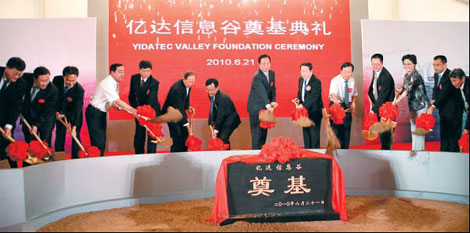|

Scheduled for completion in 2014, construction on Yidatec Valley, another software and information industry park, started on Monday. |
The definition of an entrepreneur in business textbooks is someone who pioneers innovation, starts new ventures and has social responsibility.
Judging from his odyssey over the past 26 years, Sun Yinhuan, chairman of Yida Group, has those distinctive marks of entrepreneurship.
When Sun started his small construction company with 50 or so humble farmers in 1984, computer giant IBM had not yet set up its first mainland office.
Today Sun heads China's most reputable software park developer providing services to more than 500 high-tech firms, including 40 Fortune 500 multinationals.
Yet he remains very low profile and says his success is a story of luck.
Turning to high-tech
A Dalian native, Sun began building houses and buildings in suburban areas of the city in 1984. It was a courageous venture as very few people wanted to start private business at that time, just six years after China started its historic opening-up.
The bold effort helped the company that would become Yida earn 3.5 million yuan, an unbelievable number at the time, almost equaling the total annual income of 10,000 Chinese, who only made on average 300 to 400 yuan that year.
Following two and a half decades of rapid growth, Yida is one of Dalian's most successful business conglomerates, now integrating construction, furnishings, real estate development and equipment manufacturing.
Its revenue exceeded 1 billion yuan for the first time in 2000. It has also expanded into neighboring Russia's Far East region.
Yet as an ambitious entrepreneur, Sun began to look for something new.
"We planned to tap into new markets since the early 1990s, when we had a sizeable stake in real estate, " said Sun.
That new market had to be sustainable, in a high-tech sector that could win support from various levels of government and with the potential for business with international giants, he said.
Sun's outlook echoed the city government's drive to transform Dalian from excessive reliance on manufacturing into a more environmentally friendly place with an emphasis on high-tech.
Second phase
Today Dalian has outpaced Shanghai and Beijing to become a star outsourcing city, but the start was far from rosy 12 years ago.
Despite being expert in real estate, Sun knew little of the high-tech sector, especially the then-unpopular software business.
And in the first three years he needed to invest 300 million yuan earned by his existing business at a time when the total revenue generated from the software in the city was relatively tiny - less than 200 million yuan in 1998.
Sun's move was risky and not obviously promising, according to Xia Deren, then deputy-mayor of Dalian and a professor at a renowned university.
Still, Sun remained audacious, and the Dalian Software Park (DLSP) opened in a remote suburban wasteland in 1998.
His first and most difficult breakthrough was its first tenant. It was Sun's honesty and sincerity that lifted Neusoft's doubts about coming to Dalian, said Liu Jiren, chairman of the Neusoft, one of China's most renowned software companies.
Sun visited Liu on the third day after Spring Festival - a Christmas-like time in China when most Chinese stay home for family gatherings - lobbying Liu to headquarter his business in the DLSP.
Neusoft became the first tenant in mid-1999, a year after the park opened for business.
Following that precedent, domestic software outsourcing startups and Japanese companies rushed to the park for its low costs and abundant professionals fluent in Japanese.
Nokia become the first Fortune 500 company to set up an office in the DLSP in 2000.
As a market-oriented private operation with State assistance, the DLSP expanded quickly due to preferential tax policies, low land costs and assistance with infrastructure development. Management of the park is run privately according to market-driven rules.
DLSP is now China's largest software park with the largest number of international players. Big names like Citibank, Intel and Genpact all have operations in the park.
It is home to 500 of the city's 800 software firms.
(China Daily 06/23/2010 page15)